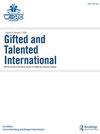Giftedness counseling in Germany: Consultation reasons and issues and their relations to gender, age, and aptitude
Q3 Social Sciences
引用次数: 1
Abstract
ABSTRACT In Germany, parents can request counseling and assessment of school-related learning and behavioral issues from either independent counseling centers or school-based ones. Focusing on giftedness consultations at independent counseling centers, the goal of this study is to provide a detailed description of the reasons for and the issues discussed during the consultation process. Specifically, the frequency and relationships among each other are examined as well as the relationships with the client characteristics gender, age, and ability. A questionnaire, completed by the counseling professionals, was used to assess the reasons that were given for seeking consultation and the topics that were addressed during the counseling process at 14 psychodiagnostic counseling centers. Overall, data from 156 children and adolescents (25% female) were included in the analyses. Frequent reasons for and topics of the consultations were giftedness assessment, advocacy of gifted education, and motivation. Correlation analyses identified two separate groups of themes: “social and behavioral problems” and “learning disorders and achievement-related problems.” Whereas the motives for seeking consultation and the counseling issues were typically the same for both boys and girls, some of these varied greatly depending on age, type of school, and aptitude of the children. These results are discussed with respect to the current state of research as well as their implications for counseling practice and the qualifications of the professional counseling personnel.德国的资优辅导:咨询原因和问题及其与性别、年龄和资优的关系
在德国,家长可以向独立的咨询中心或校本咨询中心申请学校相关学习和行为问题的咨询和评估。本研究以独立咨询中心的资优咨询为研究对象,旨在详细描述资优咨询的原因和咨询过程中讨论的问题。具体来说,检查频率和彼此之间的关系,以及与客户特征的关系,性别,年龄和能力。一份由咨询专业人员填写的调查问卷,用于评估在14个心理诊断咨询中心寻求咨询的原因和咨询过程中讨论的主题。总体而言,来自156名儿童和青少年(25%为女性)的数据被纳入分析。咨询的常见原因和主题是资优评估、资优教育的倡导和动机。相关分析确定了两组独立的主题:“社会和行为问题”和“学习障碍和成就相关问题”。尽管男孩和女孩寻求咨询和咨询问题的动机通常是相同的,但其中一些因年龄、学校类型和孩子的才能而有很大差异。这些结果就目前的研究状况以及它们对咨询实践和专业咨询人员资格的影响进行了讨论。
本文章由计算机程序翻译,如有差异,请以英文原文为准。
求助全文
约1分钟内获得全文
求助全文

 求助内容:
求助内容: 应助结果提醒方式:
应助结果提醒方式:


